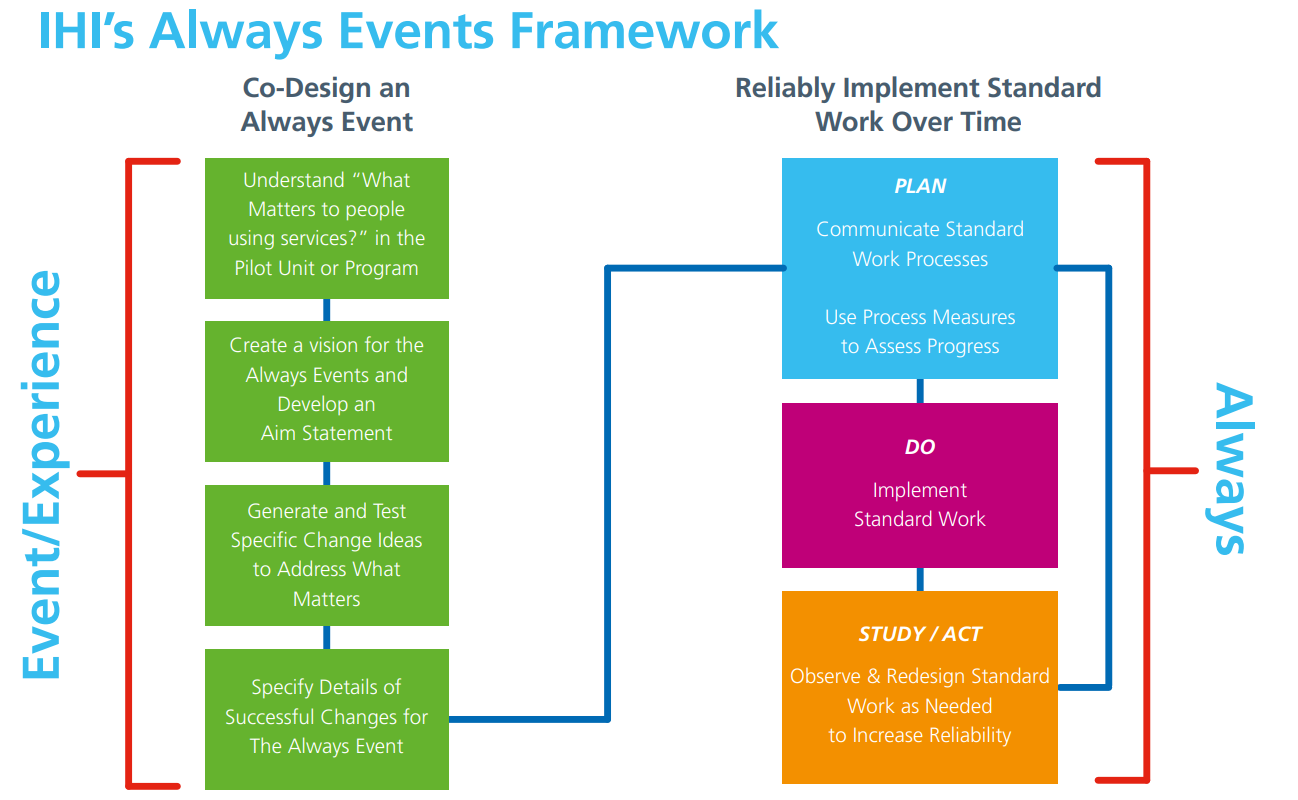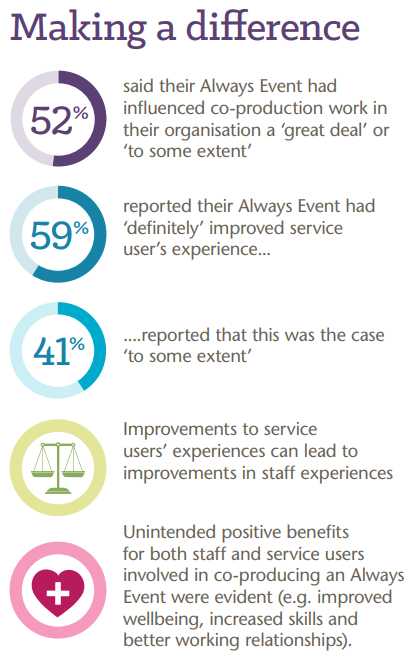Co-production using the Always Events quality improvement methodology
Always Events are defined as “those aspects of the patient and family experience that should always occur when patients interact with healthcare professionals and the health care delivery system”.
NHS England, in collaboration with Picker Institute Europe and the Institute for Healthcare Improvement (IHI), have been leading an initiative for developing, implementing, and spreading an approach to reliably integrate Always Events into routine quality improvements.
IHI’s Always Event framework
Image description: The framework displays the different stages involved in an Always Event. It starts with understanding what matters to people in the pilot unit or programme, then creating a vision and aim statement followed by generating and testing ideas to address what matters. Then using PDSA cycles (Plan Do Study Act) testing the changes and using process measures to assess progress.
Always Events is a co-production quality improvement methodology which seeks to understand what really matters to people who use services, their families and carers and then co-produce changes to improve experience of care.
Genuine partnerships between people with lived and learnt experience are the foundation for co-designing and implementing reliable solutions that transform care experiences with the goal being an ‘always experience’. The creation of an Always Events is a practical methodology for achieving this goal by asking people who use services: “What matters to you?” in addition to: “What’s the matter?”
Working together, a programme was developed to pilot and test the Always Events framework and create a toolkit to support implementation of Always Events within the NHS in England. The programme began in 2015 and involved 10 provider pilot sites across England.
Prior to the pandemic we had more than 100 provider organisations using the Always Event methodology.
Always Events toolkit
The toolkit was a result of NHS England, Institute for Healthcare Improvement and Picker (Europe) working with the initial 10 provider organisations and was published in December 2016. This has now been updated with both people with lived and learnt experience who have used the methodology.
What makes something an Always Event?
Always Events are…
- Reliable processes or behaviours that ensure optimal patient, care partner, and service user experiences of care
- Co-designed with patients, carers and people using services (done ‘with’)
- Integrated into overall person-centred care strategies.
Always Events are not…
- Evidence-based practices (eg handwashing) or professional standards of practice (eg patients are treated with dignity and respect) that should ‘always’ occur to ensure safe, high-quality care
- Improvement in processes that are done ‘for’ patients and family members
- An isolated organisational QI initiative or local improvement (‘flavour of the month’).
Evaluation of Always Events
The latest report of the Evaluation of Always Events Pilot Programme carried out by Picker Institute (Europe) was published June 2021. A number of case studies were also published highlighting the positive impact of co-producing an Always Event for both people using and providing services.
Image description:
The image lays out how Always Events have made a difference:
- 52% said their Always Event had influenced co-production work in their organisation a ‘great deal’ or ‘to some extent’
- 59% reported their Always Event had ‘definitely’ improved service users experience
- 41% reported that this was the case to some extent
- improvements to service users’ experiences can lead to improvements in staff experience
- unintended positive benefits for both staff and service users involved in co-producing an Always Event were evident (eg improved wellbeing, increased skills and better working relationships).
“Projects end. Always Events don’t end, they carry on and they become part of what we do to the point that nobody actually knows it was ever an Always Event.”
– Interim operational lead, Humber Teaching NHS Foundation Trust


